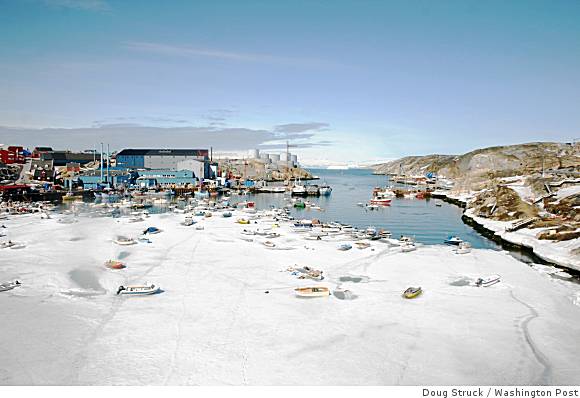

Thawing Arctic relations
COMMENT: Regular readers will know that we are champions of a high Arctic that is off-limits for oil and gas and other mineral and resource exploitation and is instead an international protected area. None of the nations which lay claim to a chunk of the Arctic supports a global protected initiative, though this article suggests that a number of nations are interested in carving off at least some of the area in a protected zone.
It's a token, and better than a complete free-for-all feeding frenzy. But outside of these relatively small protected areas? Feeding frenzy, of course.
Our hopes for the Arctic? A dead horse, a nay vote, so to speak.
If this article is to be believed, Russian ambitions in the region humble Canadian and American efforts to claim the place, but it is also Russia making the first steps to protecting at least some of the Arctic.
Leah Zimmerman
San Francisco Chronicle
Friday, July 10, 2009

Thawing Arctic relations - melting ice in Greenland is drawing attention to the Arctic. (Doug Struck / Washington Post) |
On Aug. 2, 2007, the world watched as Russia brashly planted a titanium flag under the North Pole, laying proverbial claim to the top of the world. In the months since, Russia has moved to assert control over many of the Arctic's rich resources, eyeing oil and gas fields, building floating nuclear power plants and shoring up its fleet of ice breakers - at least 14, compared with the United States' three.
President Obama met this week with Russian President Dmitry Medvedev to reset U.S.-Russian relations through discussions about nuclear arms reductions. But by focusing their first face-to-face meeting on arms reductions, they missed a key opportunity to forge a peaceful partnership and effective governance in the Arctic.
There are new signs of Russia's openness in the Arctic. At a news conference in Canada June 30, Russia called for cooperation with Canada in managing the Arctic. Three weeks ago, Prime Minister Vladimir Putin set aside some 3.5 million acres in the Russian Arctic as a national park.
The United States, too, is poised to step up its leadership in the Arctic. The Obama administration has signaled its interest in Arctic governance by sending a high-level State Department official to the Arctic Council's April Ministerial meeting in Norway. The United States and Russia can - and should - lead the way to a peaceful and sustainable Arctic. Here's how:
Both nations should prioritize environmental protection in the Arctic. Specifically, the United States should initiate an Arctic-wide conservation process, involving scientists, governments, indigenous leaders and conservationists. Russia's decision to create the Russian Arctic National Park was a surprising - yet welcomed - move toward protecting the fragile Arctic ecosystem. In contrast, the United States opened more than 73 million acres offshore in Alaska's Arctic to oil and gas extraction under the Bush administration. How ironic that oil companies have moved to access fossil fuels in the Arctic that will speed up the effects of climate change in the very place most affected by melting polar ice and warming waters.
Second, the United States and Russia must step up leadership on climate change. Scientists worldwide have concluded that a melting Arctic has severe global repercussions. To date, the United States and Russia have lagged behind the rest of the world in committing to reducing greenhouse gas. As Arctic nations, we need to step forward at the Copenhagen global climate treaty conference in December to set a clear vision for protecting the Arctic's ecosystems and communities by putting conservation first.
Third, as climate change opens additional shipping lanes in the Arctic, local communities will face myriad safety issues. Obama and Medvedev should together take steps to implement recommendations to ensure shipping safety, situate search-and-rescue resources and protect sensitive coastlines and marine mammals.
Finally, Obama and Medvedev should recognize the plight of Arctic communities and pledge necessary resources to help them adapt to a changing climate.
The United States and Russia have a historic opportunity to ensure a peaceful and protected Arctic, as well as to launch efforts in the Arctic to mitigate climate change.
Leah Zimmerman is Russia program director at Pacific Environment, a San Francisco nonprofit.
Posted by Arthur Caldicott on 11 Jul 2009